‘I go to my bedroom to decompress if tired’, says nurse who minds dementia-stricken mum and autistic son after work
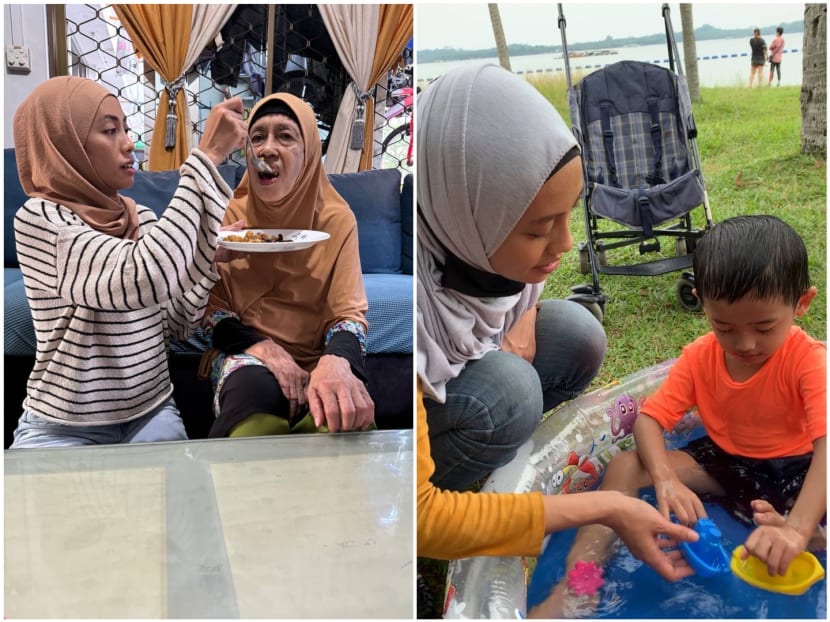
Ms Siti Farhana Jumari, a senior staff nurse with Khoo Teck Puat Hospital, pictured with her mother (left) and her son who is her second child (right).
SINGAPORE — Senior staff nurse Siti Farhana Jumari feels especially sympathetic towards patients who have dementia or are children with special needs, because seeing and tending to them hit close to home.
The 38-year-old, who works in the department of acute and emergency care at Khoo Teck Puat Hospital (KTPH), has three sons and one of them, the second child, has autism.
She also has to mind her mother who has dementia.
With dual demands to be a caregiver at work and at home, it might seem as if she may potentially suffer from burnout, but she has a couple of ways to take care of that.
“I focus on the things I’m doing at the moment. When I am at work, I focus on that and I turn on my working mode. When I’m at home, I don’t think about work,” she told TODAY.
She also emphasised the importance of self-care, even if it is something as simple as watching television or having some alone time.
“If I had a very busy, tiring day, my ‘mission’ once I reach home is to go into my bedroom to decompress. After 30 minutes to one hour, I will come out of the room and be ready to (take care of) my family.”
Instead of seeing it as a burden, Ms Siti Farhana added that being a nurse has made her more patient with her mother and son and more empathetic towards them.
It has also shaped her perspective on nursing and she is committed to upholding the same standard of care for both her patients and family.
“When you take care of others, you should treat them as your family because you would want others to treat your family well (when they are sick),” she said.
A fellow nurse at KTPH shared the same sentiments.
Senior staff nurse Raine Evangeline Tan, who works at the hospital’s Renal Centre, had to look after her mother who had end-stage kidney failure.
In 2021, she donated one of her kidneys to her mother and continues to keep an eye over her mother’s health.
Being in nursing has been an asset in caring for her mother, she said. Having a deeper understanding of her mother’s condition and dialysis helped her to communicate with more empathy.
“My background allows me to understand medical terminology better, enabling me to explain it clearly to my mum.”
And in terms of coping with stress, the 37-year-old added: “If you don’t know a lot of things related to healthcare, you may not fully grasp the magnitude of a diagnosis (and) you may not be so calm when you face a crisis.”
During the stage where her mother underwent haemodialysis, Ms Tan took care of the catheter that was inserted into her mum’s right upper chest, which channels the patient’s blood to a dialysis machine and returns the filtered blood to the patient.
She was also able to dress her mother’s wounds personally and provide medically sound advice in terms of nutrition, wound and catheter care.
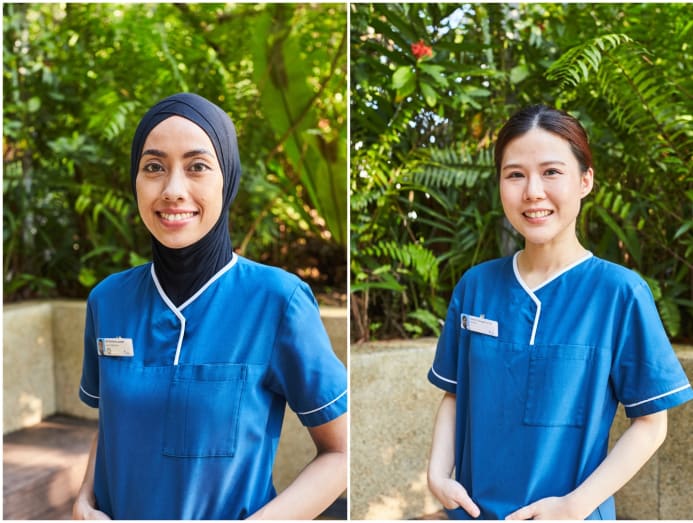
Both Ms Tan and Ms Siti Farhana opened up about how they handle the continuous demands at home and at work when family members need extra care.
They also recounted how they were called to this vocation, as Singapore marked Nurses’ Day on Thursday (Aug 1).
Unlike other countries that celebrate International Nurses’ Day on May 12, Singapore honours its nurses this month.
This dates back to the time when the island was a British colony. On Aug 1 in 1885, Catholic nuns who were from the Convent of the Holy Infant Jesus on Victoria Street took up nursing duties at the then General Hospital (the predecessor to the Singapore General Hospital) due to the shortage of trained professionals and this marked the beginning of the development of nursing in the country.
HER HEART BROKEN TWICE
Ms Siti Farhana started her career in healthcare as a paramedic in 2008 at Alexandra Hospital.
While at the Institute of Technical Education (ITE) College East pursuing her Higher National ITE Certificate in paramedic and emergency care, she found out that there was a vacancy for a paramedic at the hospital and decided to apply for it.
Her interest in nursing was piqued after discovering that paramedical work in a hospital setting was similar to nursing.
Upon the encouragement of her nurse manager when she moved to KTPH, she pursued a diploma course in nursing with the hospital’s sponsorship and became a staff nurse upon graduation with a two-year bond.
By 2018, she had completed her studies for an advanced diploma in emergency nursing with KTPH’s sponsorship and was promoted to be a senior staff nurse in 2022.
In between all this, she got married in 2014 and gave birth to three sons. However, months after her second son was born, she began seeing signs of autism in him.
“His behaviour was slightly different from his older brother, and he was always throwing tantrums and flapping his hands,” she recalled.
In January 2020, she enrolled him in the Early Intervention Programme for Infants & Children at Rainbow Centre, a social service organisation that provides support and education to persons with disabilities.
Ms Siti Farhana recalled that during his first year, she would have to take him to the centre and stay with him for two hours thrice a week.
“When I first suspected my son had autism, it broke my heart. I was worried about how he was going to grow up and who is going to take care of him when he is an adult.”
To confirm her suspicions, she spoke to doctors at the department of child development from KK Women’s and Children’s Hospital, who then referred her to an autism specialist.
“We got a solid diagnosis in 2021 when he was four years old. The doctor confirmed that he had a severe form of autism, which broke my heart for the second time.”
From there, she began taking her son to therapy sessions once a week.
In caring for her son, she said that communication is one of the biggest hurdles.
“He is non-verbal. Although he is starting to say some words, he doesn’t really communicate with people in a verbal way. If he wants something, he will pull my arms or point to me.”
She has tried teaching him how to converse and say basic responses such as “thank you”, but he does not respond accordingly and just says “la la la”, she added.
In her mother’s case, Ms Siti Farhana began noticing that she was becoming increasingly forgetful and displayed behaviours such as misplacing her phone and forgetting whether she had eaten her meal.
Sometime in late 2019, doctors confirmed that her mother had mixed dementia. In such cases, more than one cause of dementia occurs simultaneously to affect changes in the brain.
Despite being on medication, her mother’s condition has still progressed quite quickly. Both her memory and cognitive skills have deteriorated to the point where she no longer knows how to use her mobile phone and sometimes forget to feed herself.
Ms Siti Farhana is also unsure if her mother still recognises her, since the latter calls her “ustazah” (religious teacher in Malay) nowadays.
Due to her family’s needs, Ms Siti Farhana works closely with her nurse manager to schedule her roster.
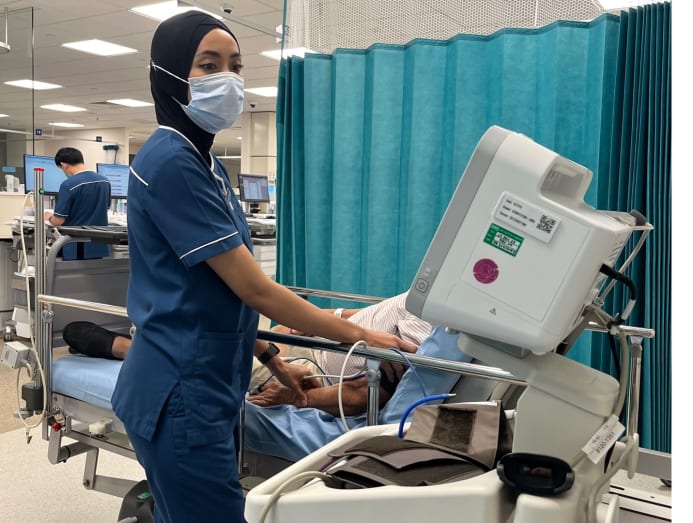
To get more support, she now has two domestic workers. The first helper is responsible for picking up her children from school, along with cooking and cleaning.
The second helper, who came into the picture after her mother had a fall in November last year, now helps her mother with feeding, showering and toileting.
To further manage some of the load, Ms Siti Farhana delegates some of her caregiving duties to her husband and brothers.
“I focus more on my (second son), while my husband focuses on our first and third sons,” she said.
She also has two brothers, the second oldest of whom now lives with their mother. Like Ms Siti Farhana, he is married with three children.
Getting support from others is vital to prevent burnout, because caregiving is a communal effort.
Stressing the importance of knowing when to seek help, she said, “Don’t forget to find someone to talk to. You are not alone and you (should) share what you are feeling with others.”
It is also good to look for others who are in the same situation, because they would be able to relate and offer emotional support, she added.
GIVING BACK A PART OF WHAT MUM GAVE HER
As for Ms Tan who donated her kidney to her mother, she was working in healthcare for several years after graduating in 2009 from Nanyang Polytechnic with a diploma in nursing — until her mother’s illness and the Covid-19 pandemic directed her to the Renal Centre at KTPH in 2020.
She first worked as a nurse at Tan Tock Seng Hospital for six years after her studies and was posted to its neurology department.
She then left to try something new and became a medical vendor for nearly two years, when she sold medical equipment, devices and supplies to healthcare facilities.
However, she missed the direct patient care that came with being a nurse, which reaffirmed her belief that it is her true calling.
With that, she returned to the field to work at Mount Elizabeth Hospital.
After her mother’s kidney failure diagnosis in 2018 and Ms Tan volunteered to donate one of her kidneys, the lead-up to the transplant surgery required extensive treatment, prompting her to seek a more flexible job to care for her mother.
Over the next two years, she worked as a medical vendor again and also became a locum nurse who stood in for nurses who were away from duty.
Both jobs afforded her more freedom to manage her mother's medical appointments and treatments.
However, with the onset of the Covid-19 pandemic, Ms Tan decided to look for stabler employment in a full-time nursing job and the opportunity arose at KTPH’s Renal Centre.
"Since I (was) going for a kidney transplant, I thought I should dive in to learn about chronic kidney disease and see what dialysis is like," she said.
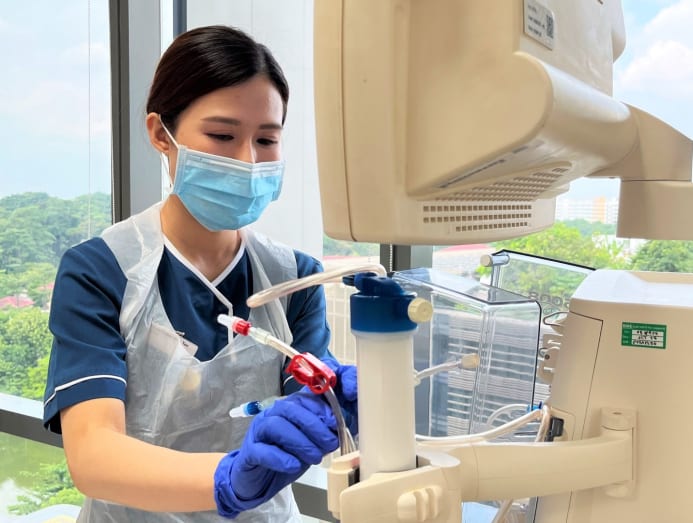
Ms Tan and her family were aware that the mother’s kidney would fail one day.
"Mum’s case was not the usual kidney disease progression. Genetically, she was born with one kidney that is bigger than the other, so she had known since her 30s that she had only one functioning kidney."
Up to the point of her diagnosis, the mother had been relatively healthy.
Upon the diagnosis, doctors at Tan Tock Seng Hospital offered three treatment methods:
• Peritoneal dialysis (using the lining of one’s abdomen or belly to filter one’s blood)
• Haemodialysis (a machine removes blood from one’s body and filters it through an artificial kidney before returning the cleaned blood to one’s body)
• Organ transplant
Ultimately, it was Ms Tan’s idea to go through with the organ transplant and donate her kidney. She had seen first-hand the difficulties of dialysis and did not want to see her mother go through it indefinitely.
“I had already thought (of donating a kidney) when I was younger. I knew that if I could do this for my mum, I would. If I never gave it a try, the ‘what if’ would have always haunted me,” she said.
There were some hurdles to cross before the organ transplant.
In a simple transplant in which a donor and recipient’s blood or antibodies are compatible, a surgery can be carried out without concern of organ rejection.
"Our risk of rejection was relatively higher because she has a high amount of antibodies against my blood," Ms Tan explained.
This required more tests, screenings and multiple rounds of plasma exchange to bring her mother’s antibody levels down to a safe range for the transplant. This process took more than a year.
This journey was so tough, so everyone would feel very disheartened or frustrated at certain points, but they were always there to support us.
In February 2020, Ms Tan and her mother were scheduled for surgery, but in a matter of weeks, all elective surgeries had to be postponed due to the outbreak of Covid-19.
It was not until 2021 that they could finally proceed with the transplant.
By then, the mother had undergone dialysis for three months due to her worsened condition. She also had to go for a few more rounds of plasma exchange before the surgery could finally take place.
Ms Tan said that a fundamental pillar of support for her was her mother’s transplant team at Singapore General Hospital.
“Every transplant journey is a ship set sail in the sea. You are uncertain whether you will meet storms, but there was always (this) beacon for us.”
She added that the team provided both medical and emotional support, from the pre-transplant to post-transplant stages.
“This journey was so tough, so everyone would feel very disheartened or frustrated at certain points, but they were always there to support us.”
In one instance, the team helped her mother find the right combination of medications after she experienced side effects including liver inflammation from an anti-rejection medicine that was first prescribed.
The team worked on coming up with a new cocktail of medications that eliminated the side effects and allowed her mother’s body to accept the anti-rejection medicine in preparation for the transplant surgery.
Ms Tan’s other family members were instrumental in supporting her mother’s post-surgery recovery and hers.
They took turns to care for the mother while Ms Tan was on hospitalisation leave, and her brother took annual leave from the Republic of Singapore Air Force to attend to her and their mother as well as prepare meals for them.
The support network extended to Ms Tan’s colleagues, who pitched in with helping hands and listening ears after hearing of her surgery.
In her free time, Ms Tan, who is single, instils some balance in her life by engaging in leisurely activities with her colleagues, be it eating out, going hiking or singing karaoke.
After her mother’s surgery, Ms Tan found time to further her nursing education, earning a bachelor degree in nursing from the United Kingdom's Edinburgh Napier University and an advanced diploma in nephro-urology nursing (related to kidney diseases) from Nanyang Polytechnic last year.
The health of her mother has improved greatly after the transplant.
“The new kidney worked pretty well from the first day itself and she recovered fast enough for someone in her situation,” Ms Tan said.
She added that her mother felt liberated from not having to undergo dialysis and experience complications, but she does have to keep up the daily blood pressure checks, adhere to a strict healthy diet, and do quarterly blood tests with the Singapore General Hospital’s Transplant Centre.
Her mother is also able to spend her days going to the market, visiting her friends and family, and even going on the occasional trip abroad.
Seeing her mother healthier and happy makes Ms Tan glad that she opted for the transplant and never wavered in her decision.
She recalled that her mother once felt guilt over the transplant process, to which Ms Tan replied: “As a parent, you gave life to me. Every part of me that I have now, is what you have given me, so I’m just giving you back a part of yourself.”
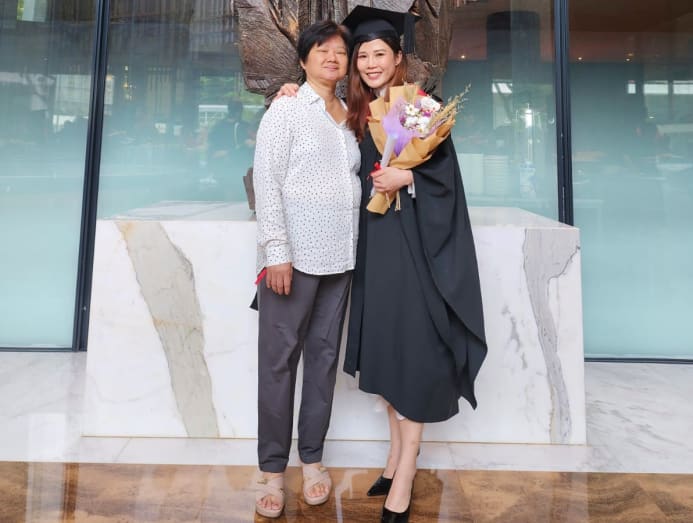
For Ms Siti Farhana, whose son is now seven, it is the small milestones he hits that makes her happiest.
“He can say more words such as (those to do with) animals, fruits, letters in the alphabet and numbers, and he now knows when it is time to change diapers.”
For people who feel called to be a nurse, Ms Siti Farhana encourages them to “just go for it”.
“Choose (a medical discipline) that you are comfortable in, then pursue it and go for a specialised course. Don’t be afraid because there are many opportunities for career growth.”
And when support is needed, do not be afraid to ask.
She said: “I am able to balance my work and family life thanks to my nursing supervisors. They are very supportive and able to meet my needs, as well as grant me requests (to accommodate my family).”






